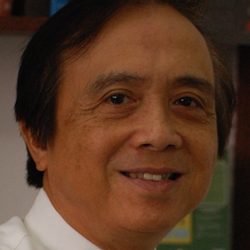SUMMARY
This is AI generated summarization, which may have errors. For context, always refer to the full article.

Ernesto “Ernie” Pernia, a US-educated university professor, is a deliberate person. He does not spew out his thoughts recklessly, perhaps inculcated in the rigor of getting a PhD. A former seminarian, he comes across as mild-mannered and carries about him a quiet demeanor.
Pernia has spent many years of his life teaching at the University of the Philippines School of Economics where he is currently professor emeritus. At 72, he has had a rich life in the academe, interspersed with project management work as lead economist at the Asian Development Bank.
So what is he doing with Rodrigo Duterte, the curse-happy presidential candidate who says the most outrageous things?
This is a question that can be asked of many others including professionals, millenials, and members of the chattering classes who believe in Duterte and his promise to bring change to the country. Pernia is one of them – and his story may give part of the answer.
Personal ties
It all began with personal ties. Pernia’s brother-in-law, a 1st cousin of Duterte, asked him to help out. Pernia and Duterte were passing acquaintances and their families shared common roots in Cebu but he had followed developments in Davao City and was aware of some of its successes.
In December last year, Pernia met with Duterte at the Holiday Inn in Pasig where they talked informally, a getting-to-know you session. This was followed by a meeting with Duterte’s most trusted person, Leoncio “Jun” Evasco, who runs the campaign. Past personal relationships worked again as Evasco, a former priest, was Pernia’s senior in the Immaculate Heart of Mary Seminary in Bohol. Evasco and Pernia are both from Bohol.
By that time, Pernia had already committed to volunteer for the campaign and craft an economic program. He presented this to Duterte last January in Davao during a dinner-meeting. It was a two-page outline of broad ideas that cohered under the theme, “poverty and inequality-reducing economic growth increasingly fueled by clean and green energy.” Pernia’s brothers, accomplished in their fields – Joseph who worked on finance and private sector development with the World Bank and Antonio, a priest and former superior general of the Society of the Divine Word – contributed their ideas.
The Davao meeting turned out to be “freewheeling” and “not very organized,” recalls Pernia. Over dinner, Duterte spoke animatedly about law and order and why it is important in the grand scheme of things and that if criminality is solved then a major obstacle to investments is hurdled.
Duterte appeared comfortable with Pernia, who discussed the proposed economic platform with power-point slides. Two others made their presentations to prepare Duterte for the Rappler candidates’ forum in Manila.
Need to internalize economic issues
The key points raised by Pernia covered the following:
- Investment climate: Infrastructure development, streamlining of bureaucracy, taxation following regional/global standards, labor market stability, prudence in fiscal and monetary policy and easing of constitutional restrictions on foreign direct investments (FDIs).
- Regional and rural development: Shift of emphasis on infrastructure spending from Metro Manila and Calabarzon to regional/provincial urban centers, rural/agricultural areas.
- Decentralization of governance toward eventual federalism
- Employment-generating sectors: Promotion of renewable energy and assistance for agriculture and agri-business, manufacturing, tourism and medium and small-scale industries.
- Radical reform of judicial system
- Human and knowledge capital: Fee lunch for all public elementary school children up to grade 6, science and technology research and development.
- Values formation: Religious faith driving secular conduct.
Duterte did not disagree with Pernia on any of these. But – and this is a big but – he has not “internalized” the economic issues. “There is a need for an intensive discussion and he needs to think about these deeper,” Pernia says.
In two recent appearances before business groups, at the Wallace Forum and Go Negosyo, Duterte did not “bone up” on economic issues. These were the audiences that needed to hear where he stood on business and the economy.
From the quiet of his sprawling home in La Vista, Pernia mulls Duterte’s lack of focus on economic issues and sharpness in framing inequality and poverty as key parts of his platform and, in a light vein, quips: “I really don’t know if he considers me one of his economic advisers.”
Duterte did talk, though, about increasing foreign ownership of businesses in the country to up to 70% which means amending the Constitution (which allows 40% foreign ownership) and leasing lands to foreigners for 40 years, subject to renewal.
‘Acts fast’
Pernia is holding on. “There is no perfect candidate,” he says. “I’m willing to take a risk on him. He is results-oriented, he acts fast.”
What helps is that they share similar ideas including boosting regional development and strong advocacy for family planning.
He believes what Evasco and other supporters say about Duterte’s alleged penchant to kill criminals, that he himself doesn’t do the killing, that he gives the orders to policemen to kill them if they resist arrest. He considers all this talk about murdering hundreds as “hyperbole.”
Pernia has deep reservations about some of Duterte’s actions (forcibly kissing women in Pampanga during a sortie) and statements to the effect that if people don’t want his style then they should choose other candidates.
“He has to adjust his style,” Pernia shakes his head. “He has to be circumspect.”
Meantime, the professor continues to reach out to the candidate to get his message across to internalize economics. – Rappler.com
“The Scrum” is Rappler’s take on issues and personalities of the 2016 elections. Derived from a media term that refers to reporters surrounding politicians to press them to answer questions and respond candidly, “The Scrum” hopes to spark smart conversations on politics and elections.
Add a comment
How does this make you feel?
There are no comments yet. Add your comment to start the conversation.